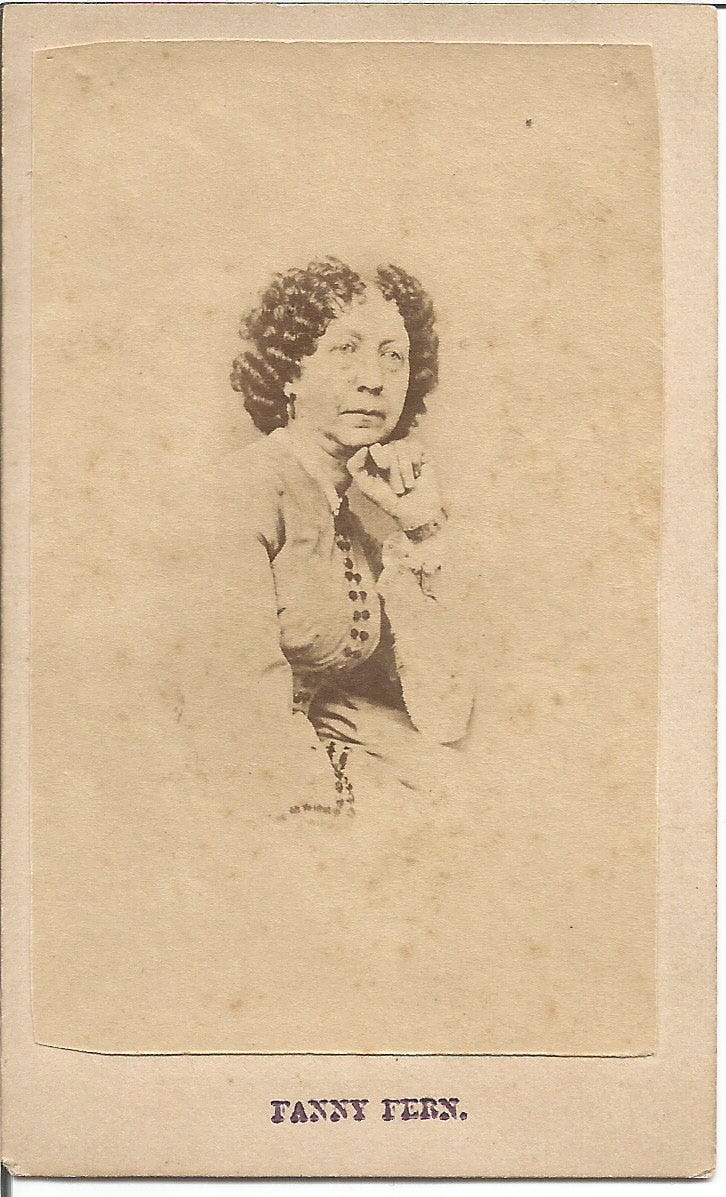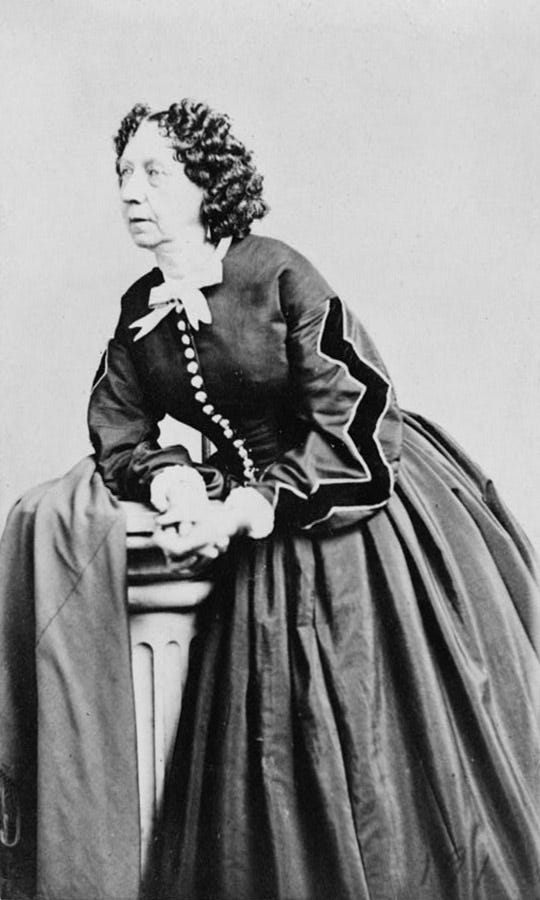She Persisted
The first female columnist in America weathered a long, dark time
What book do you reach for on a hard day?
Do you have a figure from the past whose example gives you courage?
I think often about a writer who endured more than I can comprehend. She might gladly have given her hardships back, but without them, she would not have found her unique place in history as a writer of wit and inspiration for countless women. I take courage from her. You might, too.
In 1851, a thirty-nine-year-old widow with two young girls made the rounds of publishing offices in Boston to find out if anyone would buy one of her humorous articles. She tried not to reveal her desperation. Male editors gave her rude looks and asked personal questions of the woman carrying manuscripts, accompanied by a seven-year-old child.1 Of necessity, her ten-year-old lived twenty miles away with grandparents.
By the end of 1852, prospects were finally looking up for Sara. Starting with “The Model Husband” in the Boston Olive Branch, her short, witty, satiric articles attracted enough attention that a New York paper engaged her as a salaried columnist — the first woman in America with such a contract. A publisher approached her about collecting her articles into a book, and in 1853, the first compilation of her essays was a bestseller. Other books followed. With her writing career securely launched, the worst years of Sara’s poverty, grief, and isolation were behind her.
Before it broke, the dark time had lasted eight years.
Self-sustaining power
Sara was born in Portland, Maine, in 1811, the fifth of nine children to a second-generation newspaperman and his wife. She grew up in Boston and attended school in Connecticut. Between 1837 and 1844, she married a banker and had three daughters with him.

The tragedies came suddenly, one after another, most of them by surprise. In 1844, Sara’s youngest sister died in childbirth, followed shortly by their mother. The next year, she lost her oldest daughter (age six or seven) to meningitis. In 1846, her husband died suddenly of typhoid fever, leaving no money for his widow and surviving daughters, ages 2 and 5.
Reluctantly, Sara’s father and her in-laws provided her with enough of a living stipend to keep her with her children in a boarding house, both making it clear that they expected her to remarry.
When she did, to Samuel in 1849, the marriage was not only an intellectual mismatch; Sara may also have misunderstood her husband’s sexual expectations. In a novel based on her life, a character makes a second marriage to a man who pledged to love and care for her child. Instead, the fictional wife exclaims,
How can I describe to you my gradual waking up from this delusion? The conviction came slowly—but surely—that he was a hypocrite, and a gross sensualist. That it was passion, not love, which he felt for me, and that marriage was only the stepping-stone to an else impossible gratification. … O, the creeping horror with which I listened to his coming footsteps! … To him my disgust was only coyness, and served but as fuel to the flame.2
Her granddaughter later wrote that Sara stayed with Samuel “until he reached the point of threatening personal violence.”3
In January 1851, Sara moved with her daughters into a Boston hotel and sought help from her youngest daughter’s godfather, an attorney. This provided her with some physical and temporary financial protection, while Samuel accused her publicly of adultery as grounds for divorce. It rankled with Sara that neither her father nor her older brother defended her; they blamed her for causing a scandal.4
In 1857, she would write of women trapped in bad marriages,
There are aggravated cases for which the law provides no remedy—from which it affords no protection; … Let a woman who has the self-sustaining power quietly take her fate in her own hands, and right herself. Of course she will be misjudged and abused.5
The history of mankind is a history of repeated injuries and usurpations on the part of man toward woman, having in direct object the establishment of an absolute tyranny over her.
….
He has so framed the laws of divorce … as to be wholly regardless of the happiness of women - the law, in all cases, going upon the false supposition of the supremacy of man, and giving all power into his hands.
(“Declaration of Sentiments,” Seneca Falls Women’s Rights Convention, 1848)
Wanting the commonest necessaries of life
The next year and a half may have been the most difficult period yet. In 1851, though still legally married, Sara had no visible means of support. She moved into a cheaper boarding house than the one where she had lived between marriages. She kept her youngest daughter with her and, because she could not be sure of feeding all three of them, she allowed her oldest to live with her paternal grandparents, who were unaffectionate and “rigid.” Sara and daughter Nelly lived on bread and milk; Nelly wore outgrown shoes.6
Sara walked the rounds of newspaper offices with her seven-year-old, looking for work. By summer she was offered fifty cents for one article; she had to “call many times” to get paid, but a larger Boston paper copied it, which gave her hope.7
In an autobiographical novel published less than three years later, she wrote that the title character at the same juncture of her career
was in very destitute circumstances when she first solicited the patronage of the public; often wandering from one editorial office to another in search of employment, while wanting the commonest necessaries of life.
Coming from a publishing family, Sara asked her nearest brother, editor of a successful magazine, to help her place her articles. He answered (in part),
New York is the most over-stocked market in the country, for writers. … Your writings show talent, but they are in a style that would only do in Boston. You overstrain the pathetic, and your humor runs into dreadful vulgarity sometimes. I am sorry that any editor knows that a sister of mine wrote some of these which you sent me. In one or two cases they trench very close on indecency. For God’s sake, keep clear of that.8
He neither published any of her articles nor helped her publish them with anyone else.
The Boston Olive Branch, the paper that hired her for fifty cents, took more articles, and a second paper, the True Flag, accepted her work also. She wrote with pseudonyms, settling after a few tries on one with a friendly, floral sound.
In 1852, her writings caught the eye of a New York editor, who offered to double her salary if she would commit to an exclusive column. She kept writing for multiple papers, her earnings now at least thirteen dollars a week.
In 1853, Sara — writing under her pseudonym — took the risk of 10% royalties on her first book rather than an outright fee. It was a good choice. Demand for her instant bestseller rose to around 70,000 copies in the first year. With her earnings and her eventual divorce from Samuel, Sara was able to buy herself a house and live with both her daughters. Her star continued to rise. In 1856, the New York Ledger paid her an unprecedented $100 per week for her column.
When she married again, it was a marriage of mutual respect rather than financial necessity. In a prenuptial agreement, her younger husband agreed that she owned all her articles and books. She continued writing books and her popular weekly column in the Ledger until her death from cancer in 1872.

Writing around the edges
On hard days, I think about Sara Payson Willis Parton, aka Fanny Fern, writing while her daughter slept in the upper room of the boarding house where she was also required to wash the stairs — an afterthought from the landlady not negotiated in the original tenancy agreement.
In her autobiographical novel Ruth Hall (1854), when the two sisters reunite, Katy, the oldest who has lived with her grandparents, has missed her mother and had to endure criticism of her. Nettie, the young one, replies of the lodging that Katy missed:
“The wind blew into the cracks of the room so cold; and the stove smoked; and I was afraid to eat when we had any supper, for fear mamma would not have enough. … And one night mamma had no money to buy candles, and she wrote by moonlight; and I often heard her cry when she thought I was asleep; and I was so afraid of mamma’s landladies, they screamed so loud, and scowled at me so.”
Fanny Fern’s essays reveal one of the chief strategies of her adaptation: brevity.
An online archive, Fanny Fern in the New York Ledger, provides many samples of her work from the years after she brought her daughters back together and wrote with more comfort. Still, she could sometimes make an entire point in a paragraph, as in “Matrimonial Advertisements” (3 January 1857), an article amplifying her scorn of men advertising for wives in newspapers into an exposé of the legal helplessness of women in marriage.
In an earlier example, collected in her 1854 second series of Fern Leaves from Fanny’s Portfolio, she satirizes possessive husbands and the misogynist press at once. The first line is a quotation from another paper. She responds in a characteristic rapier paragraph:
CURIOUS THINGS.
Curious: The exaggerated anxiety of wives to see the women who were formerly loved by their husbands.—Exchange.
Well, yes—rather curious; there are a great many curious things in this world. Curious, your husband always perceives that you are “sitting in a draft,” whenever one of your old lovers approaches you in a concert room; curious he insists upon knowing who gave you that pretty gold ring on your little finger; curious that you can never open a package of old letters, without having his married eyes peeping over your shoulder; curious he never allows you to ride on horseback, though everybody says you have just the figure for it; curious he always sends his partner on all the little business trips of the firm; curious such an ugly frown comes over his face when he sees certain cabalistic marks in a masculine hand, in the margin of your favorite poet; curious that he will not let you name your youngest boy Harry, unless you tell him your confidential reasons; curious he is always most gracious to the most uninteresting men who visit the house; and very curious, and decidedly disagreeable, that whenever you ask him for money, he is so busy reading the newspaper that he can’t hear you. (p. 48)

Just one good paragraph
I think about Fanny Fern and her one-paragraph essays when I feel overstretched.
Sara-of-many-surnames wrote in Ruth Hall about the difficulty of writing without any moments to herself except the time when her daughter slept. In one passage,
A dull, drizzling rain spattered perseveringly against Ruth’s windows, making her little dark room tenfold gloomier and darker than ever. Little Nettie had exhausted her slender stock of toys, and creeping up to her mother’s side, laid her head wearily in her lap.
“Wait just a moment, Nettie, till mamma finishes this page,” said Ruth, dipping her pen again in the old stone inkstand.
The child crept back again to the window, and watched the little pools of water in the streets, as the rain-drops dimpled them, … and wished she had Katy to play with her, when mamma wrote such a long, long time; and then little Nettie drew such a heavy sigh, that Ruth dashed down her pen, and taking her in her arms and kissing her, [began singing nursery songs].
…
Ruth laid the child gently on her little bed, and resumed her pen; but the spell was broken, and “careful and troubled about many things,” she laid it down again, and her thoughts ran riot.” (p 111-112)
In another,
Scratch—scratch—scratch, went Ruth’s pen; the dim lamp flickering in the night breeze, while the deep breathing of the little sleeper was the watchword, On! to her throbbing brow and weary fingers. One o’clock—two o’clock—three o’clock—the lamp burns low in the socket. Ruth lays down her pen, and pushing back the hair from her forehead, leans faint and exhausted against the window-sill, that the cool night-air may fan her heated temples. How impressive the stillness! … A sweet peace steals into her troubled heart, and the overtasked lids droop heavily over the weary eyes.
Ruth sleeps. (p. 103)
Even without the deaths she endured, the loathsome second marriage, family rejection, or her poverty, Fanny Fern was a mother scrambling for time to focus her attention and write.
In the early years, her sketches were very short. What she could write under her circumstances was enough.
What you and I can make of our circumstances may also be enough.
Additional online sources
“Fanny Fern: A Brief Biography,” https://fannyfern.org/bio.
Fanny Fern and Ethel Parton Papers, Smith College Libraries. https://findingaids.smith.edu/repositories/2/resources/544#:~:text=The%20couple%20had%20three%20daughters%2C%20Mary%2C%20Grace%2C%20and%20Ellen.
Joanna Scutts, “Feminize Your Canon: Fanny Fern,” Paris Review, May 14, 2020. https://www.theparisreview.org/blog/2020/05/14/feminize-your-canon-fanny-fern/.
On Substack
Kern Carter, “Authors Making Money: Fanny Fern was a star,” Feb. 18, 2024.
Includes a Saturday Evening Post article by Fanny Fern from 1862, “Rainy Days.”
Explains why Fanny Fern was “a bad ass,” a sound scholarly opinion. 😉
Reminder
If you participated in last week’s Five-Word Reading Party, the deadline is Sunday of this week for your five words about someone’s post to make it into the after-party surprise on (or near) Monday. Some weeks, like this one, it’s Monday-ish.
Five words for International Women’s Day:
She did; so can you!
Joyce W. Warren, Fanny Fern: An Independent Woman (Rutgers University Press, 1992), p. 92.
Rose Clark, pp. 235-37, quoted in Warren, p. 84-85.
Quoted in Warren, p. 85.
Warren, pp. 85-87.
New York Ledger, Oct. 24, 1857, qtd. in Warren, p. 88.
Warren, pp. 88-91.
Warren, p. 92.
Quoted in Warren, p. 93.
Subscribe to Quiet Reading with Tara Penry
A weekly refuge for our shared humanity inspired by authors, books, and this world of marvels.















Fanny Fern! My new hero. What a story and through it all she persevered. She knew she could break the mold and pave the way for women authors. Thx for sharing her story and honoring her today with this wonderful piece.
I must admit I knew little about Fanny Fern. But as I read her story here, I am drawn to her resilience and determination. I think it was Shirley Jackson who said she wrote on the edges of the day, much like Fern did as a mother and wife with limited resources. Thank you for enlightening me with this piece of history. Here's to another strong woman! 💪